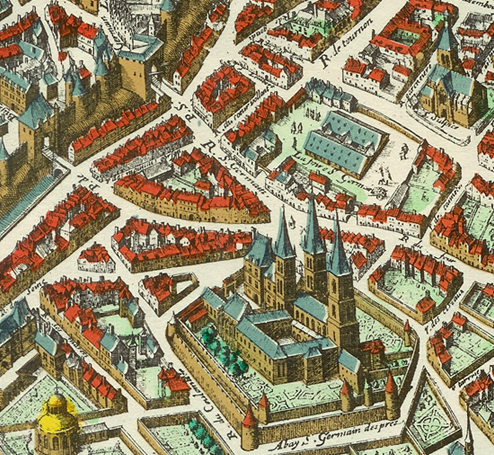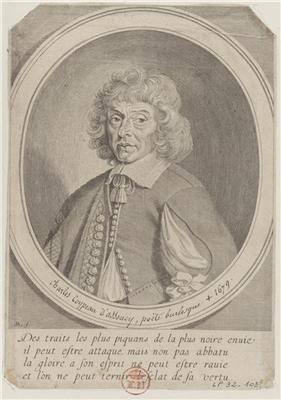|
François Datelin
François Datelin, called Fanchon Brioché, was a famous 17th-century French puppeteer. The son of Jean Brioché, he took over his father's puppets theatre at foires Saint-Laurent and Saint-Germain when the latter died. According to Brossette, he even surpassed his father in the art of making his puppets act and speak pleasantly. In 1677, Boileau immortalized Brioché's son in his sixth epistle to Racine : "And not far from the place where Brioché chairs…". It was he whose monkey Fagotin was killed with a sword by Cyrano de Bergerac who had mistaken him for a servant who was making wince to him and gave rise, on the part of his former lover d'Assoucy, to a curious literary work entitled ''Combat de Cirano de Bergerac contre le singe de Brioché au bout du Pont-Neuf''. The name and part of Fagotin, who died in the so uneven duel against Cyrano, survived him and Fagotin was, until the last years of the seventeenth, the obligatory companion of every good puppet manipulator. S ... [...More Info...] [...Related Items...] OR: [Wikipedia] [Google] [Baidu] |
Jean Brioché
Pierre Datelin, dit Jean Brioché, (1567 – 1671) was a famous French puppeteer. First a tooth-puller, Brioche opened in Paris in 1650, the first puppet theaters at foires Saint-Laurent et Saint-Germain, The gaiety and verve of his speeches helped make his name and that kind of entertainment equally popular. He later went to Switzerland, where he was imprisoned and almost judged as a sorcerer, because the mechanism of his young players couldn't be understood. Upon retirement, his little theatre was taken over by his son Fanchon, who, according to Claude Brossette, was even more successful than his father. Sources * Gustave Vapereau, ''Dictionnaire universel des littératures'', Paris, Hachette, 1876, (p. 326) * Charles Magnin Charles Magnin (born in Paris, 4 November 1793; died there,7 October 1862) was a French author. Biography He received a brilliant education, and in 1813 became assistant in the Bibliothèque nationale de France, imperial library, and in 1832 on ... [...More Info...] [...Related Items...] OR: [Wikipedia] [Google] [Baidu] |
Théâtre De La Foire
Théâtre de la foire is the collective name given to the theatre put on at the annual fairs at Abbey of Saint-Germain-des-Prés, Saint-Germain and Saint-Laurent church, Paris, Saint-Laurent (and for a time, at Saint-Ovide) in Paris. Foire Saint-Germain The earliest references to the annual fair date to 1176. The fairground itself was established in 1482 by Louis XI for the benefit of the Abbey of Saint-Germain-des-Prés and was located near the Abbey on the Rive Gauche, Left Bank southwest of the city center just outside one of the gates of the Wall of Philip II Augustus, Paris, city wall built by Philip II at the beginning of the 13th century. The covered Saint-Germain market today occupies part of the former fairground site with access from the Boulevard Saint-Germain via the Rue de Montfaucon satellite view. The fair generally lasted three to five weeks around Easter. During the 18th century it consistently opened on 3 February and lasted until Palm Sunday. The fair's first a ... [...More Info...] [...Related Items...] OR: [Wikipedia] [Google] [Baidu] |
Nicolas Boileau-Despréaux
Nicolas Boileau-Despréaux (; 1 November 1636 – 13 March 1711), often known simply as Boileau (, ), was a French poet and critic. He did much to reform the prevailing form of French poetry, in the same way that Blaise Pascal did to reform the prose. He was greatly influenced by Horace. Family and education Boileau was the fifteenth child of Gilles Boileau, a clerk in the Parliament of Paris. Two of his brothers attained some distinction: Gilles Boileau, the author of a translation of Epictetus; and Jacques Boileau, who became a canon of the Sainte-Chapelle, and made valuable contributions to church history. The surname " Despréaux" was derived from a small property at Crosne near Villeneuve-Saint-Georges. His mother died when he was two years old; and Nicolas Boileau, who had a delicate constitution, seems to have suffered something from want of care. Sainte-Beuve puts down his somewhat hard and unsympathetic outlook quite as much to the uninspiring circumstances of these ... [...More Info...] [...Related Items...] OR: [Wikipedia] [Google] [Baidu] |
Jean Racine
Jean-Baptiste Racine ( , ) (; 22 December 163921 April 1699) was a French dramatist, one of the three great playwrights of 17th-century France, along with Molière and Corneille as well as an important literary figure in the Western tradition and world literature. Racine was primarily a tragedian, producing such "examples of neoclassical perfection" as ''Phèdre'', ''Andromaque'', and ''Athalie''. He did write one comedy, '' Les Plaideurs'', and a muted tragedy, ''Esther'' for the young. Racine's plays displayed his mastery of the dodecasyllabic (12 syllable) French alexandrine. His writing is renowned for its elegance, purity, speed, and fury, and for what American poet Robert Lowell described as a "diamond-edge", and the "glory of its hard, electric rage". Racine's dramaturgy is marked by his psychological insight, the prevailing passion of his characters, and the nakedness of both plot and stage. Biography Racine was born on 21 December 1639 in La Ferté-Milon ( Aisne) ... [...More Info...] [...Related Items...] OR: [Wikipedia] [Google] [Baidu] |
Cyrano De Bergerac (play)
''Cyrano de Bergerac'' is a play written in 1897 by Edmond Rostand. There was a real Cyrano de Bergerac, and the play is a fictionalisation following the broad outlines of his life. The entire play is written in verse, in rhyming couplets of twelve syllables per line, very close to the classical alexandrine form, but the verses sometimes lack a caesura. It is also meticulously researched, down to the names of the members of the Académie française and the ''dames précieuses'' glimpsed before the performance in the first scene. The play has been translated and performed many times, and it is responsible for introducing the word ''panache'' into the English language. The character of Cyrano himself makes reference to "my panache" in the play. The most famous English translations are those by Brian Hooker, Anthony Burgess, and Louis Untermeyer. Plot summary Hercule Savinien de Cyrano de Bergerac, a cadet (nobleman serving as a soldier) in the French Army, is a brash, strong ... [...More Info...] [...Related Items...] OR: [Wikipedia] [Google] [Baidu] |
Charles Coypeau D'Assoucy
Charles Coypeau (16 October 1605 Paris – 29 October 1677, Paris) was a French musician and burlesque poet. In the mid-1630s he began using the ''nom de plume'' D'Assouci or Dassoucy. Life From the time he was eight or nine, Charles Coypeau began running away from home. His father then placed him in the Jesuit Louis-le-Grand, College of Clermont, where he acquired a solid education in classics and Christian doctrine; but the boy was always sneaking away to watch the puppeteers and organ grinders on the Pont-Neuf. These contacts with players and musicians were a major factor in the formation of Charles's musical and poetic talents, and encouraged his bent for the "burlesque". By the time he was 17, Charles had left Paris and had begun his long life of wandering, eking out a livelihood by composing, singing for local elites, and teaching the lute. By his mid-20s, he apparently had made his way to Italy; by the early 1630s, he had mastered the Italian theorbo, an instrument still ... [...More Info...] [...Related Items...] OR: [Wikipedia] [Google] [Baidu] |
Gustave Vapereau
Louis Gustave Vapereau (4 April 1819 – 18 April 1906) was a French writer and lexicographer famous primarily for his dictionaries, the ''Dictionnaire universel des contemporains'' and the ''Dictionnaire universel des littérateurs''. Biography Born in Orléans, Louis Gustave Vapereau studied philosophy at the ''École Normale Supérieure'' from 1838 to 1843, writing his thesis on Pascal's ''Pensées'' under the supervision of Victor Cousin. He taught philosophy at Tours until the establishment of the Second French Empire in 1852, when his republican principles cost him his position. Vapereau returned to Paris to study law, and in 1854 joined the French bar. He did not engage in any legal practice and returned to writing shortly afterwards. In 1858, he published the ''Dictionnaire universel des contemporains'' and from 1859 to 1869 he edited the ''L'Année littéraire et dramatique''. After the collapse of the Empire, Vapereau was appointed prefect of Cantal on 14 September ... [...More Info...] [...Related Items...] OR: [Wikipedia] [Google] [Baidu] |
Charles Magnin
Charles Magnin (born in Paris, 4 November 1793; died there,7 October 1862) was a French author. Biography He received a brilliant education, and in 1813 became assistant in the Bibliothèque nationale de France, imperial library, and in 1832 one of the directors of that institution. His theatrical criticisms in ''Le Globe'' (1826-1830), his lectures at the University of Paris, Sorbonne (1834-1835) on the origin of the modern stage (theatre), stage, and his various writings won for him the praise of Sainte-Beuve, and a seat in the Académie des Inscriptions et Belles-Lettres. Magnin also wrote poetry and plays. Works His principal works are: * ''Origines du théâtre moderne'' (1838) * ''Causeries et méditations'' (2 vols., 1843) * ''Théâtre de Hroswitha'' (1845, with text and translation) * ''Histoire des marionettes'' (1852). Notes References * 1793 births 1862 deaths French journalists French theatre critics 19th-century French poets 19th-century French dramatists ... [...More Info...] [...Related Items...] OR: [Wikipedia] [Google] [Baidu] |
17th-century French Male Actors
The 17th century lasted from January 1, 1601 ( MDCI), to December 31, 1700 ( MDCC). It falls into the early modern period of Europe and in that continent (whose impact on the world was increasing) was characterized by the Baroque cultural movement, the latter part of the Spanish Golden Age, the Dutch Golden Age, the French ''Grand Siècle'' dominated by Louis XIV, the Scientific Revolution, the world's first public company and megacorporation known as the Dutch East India Company, and according to some historians, the General Crisis. From the mid-17th century, European politics were increasingly dominated by the Kingdom of France of Louis XIV, where royal power was solidified domestically in the civil war of the Fronde. The semi-feudal territorial French nobility was weakened and subjugated to the power of an absolute monarchy through the reinvention of the Palace of Versailles from a hunting lodge to a gilded prison, in which a greatly expanded royal court could be more easily ... [...More Info...] [...Related Items...] OR: [Wikipedia] [Google] [Baidu] |
French Male Stage Actors
French (french: français(e), link=no) may refer to: * Something of, from, or related to France ** French language, which originated in France, and its various dialects and accents ** French people, a nation and ethnic group identified with France ** French cuisine, cooking traditions and practices Fortnite French places Arts and media * The French (band), a British rock band * "French" (episode), a live-action episode of ''The Super Mario Bros. Super Show!'' * ''Française'' (film), 2008 * French Stewart (born 1964), American actor Other uses * French (surname), a surname (including a list of people with the name) * French (tunic), a particular type of military jacket or tunic used in the Russian Empire and Soviet Union * French's, an American brand of mustard condiment * French catheter scale, a unit of measurement of diameter * French Defence, a chess opening * French kiss, a type of kiss involving the tongue See also * France (other) * Franch, a surname * French ... [...More Info...] [...Related Items...] OR: [Wikipedia] [Google] [Baidu] |




